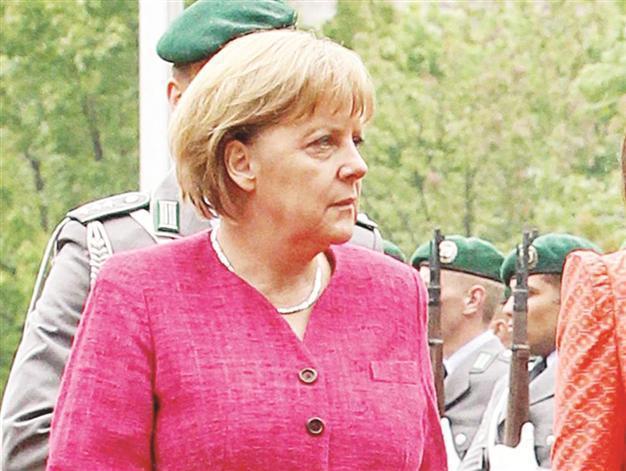Germany’s finances make use of crisis
BERLIN - The Associated Press

Merkel steers Germany successfully in dangerous waters. EPA photo
While other countries in 17-country eurozone battle investor fears that their economies are buckling under the pressure of too much debt, Germany has managed to save tens of billions of euros thanks to its reputation as a safe place for investments.The bond markets have demanded that countries such as Italy and Spain pay prohibitively high borrowing costs rates to sell their debt amid worries over their sluggish economies and creaking government finances. Such high interest rates will burden these countries’ state coffers for years to come.
Germany, meanwhile, has secured billions of euros in debt at record low - sometimes negative - interest rates.
Germany Europe’s biggest economy and is the biggest single contributor to eurozone rescue funds, with a gross domestic product of 2.6 trillion euros ($3.17 trillion). The country’s economy has grown steadily in the past two years and, with quarter-on-quarter GDP growth of 0.5 percent, prevented the eurozone a whole from sliding into recession in this year’s first quarter. Germany could have to inject up to 300 billion euros in the form of loans and guarantees to weaker European members and the bloc’s rescue funds. That would be about equivalent to the central government’s budget for one year.
The country recently sold billions of its 10-year-bonds with an interest rate -or yield- of around 1.5 percent. On July 18, it auctioned 5 billion euros ($6.1 billion) in two-year treasury notes with an average yield of minus 0.06 percent. In other words, investors are losing money and paying Germany for the privilege of safely parking their funds in the state coffers. Growing Germany offers the prospect of risk-free debt repayment, and other safe investments don’t offer great interest rates - the European Central Bank recently cut the rate on its overnight deposit facility to zero.
Unnaturally low rates
“The interest rates are unnaturally low at the moment,” Finance Minister Wolfgang Schaeuble acknowledged last month, adding they reflect the amount of “uncertainty in financial markets.”
The side-effect, however, is a gain for Schaeuble’s coffers. “Germany saves about 10 billion euros ($12.5 billion) this year alone thanks to the low interest rates,” economist Jens Boysen-Hogrefe of Germany’s Kiel Institute for the World Economy told The Associated Press.
Some analysts argue that the eurozone debt crisis has already secured Germany a windfall of about 100 billion euros ($125 billion) for Germany, giving the government extra leeway for growth-friendly spending or reducing its debt burden while other countries in the eurozone struggle to stay afloat.
Germany’s savings from its bond sales are little talked-about because money that is not spent is harder to keep track of. But a look into the government’s past financial outlooks gives an idea of the sums Germany is saving: In 2009, the government forecast that it would have to spend 52 billion euros to service its debt in 2013. Now, it expects that cost to total only 20 billion euros next year.
Should the crisis in the eurozone worsen, Germany’s savings are in danger of being seriously eroded. Roland Doehrn, the RWI economic think tank’s chief expert on growth and economic cycles, argues that gains from the eurozone’s problems should not be viewed in isolation. The first phase of the region’s financial crisis - the 2008 financial storm set off by the bankruptcy of U.S. investment bank Lehman Brothers - cost Germany dearly, forcing it to take on more debt to rescue banks and stimulate the economy. Because Germany’s overall debt significantly rose since 2008, he argues, it is not that easy to say how much Germany is exactly saving because of the crisis alone. However, an interest rate lower by 1 percent on a debt pile of 2 trillion euros would mean annual savings of about 20 billion euros, he added.
















